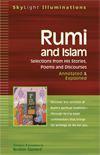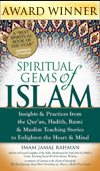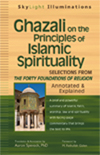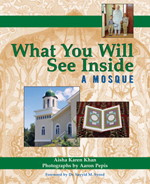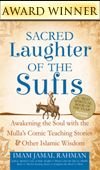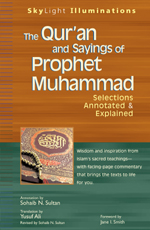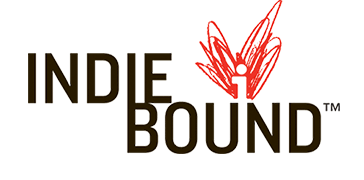Leads you through the central themes of both the Qur'an and the collected sayings of Prophet Muhammad, known as hadith. These teachings dispel common misconceptions about Muslim beliefs and offer practical guidance for your own spiritual journey.
Annotation by Sohaib N. Sultan
Translation by Yusuf Ali
Revised by Sohaib N. Sultan
Foreword by Jane I. Smith
Paperback
5½ x 8½, 256 pp | 978-1-59473-222-5
The timeless insight of Islam’s sacred writings can enrich your own spiritual journey.
For many in the West, the teachings of the Qur’an often are enshrouded in mystery and fear. Yet Islam’s holy book gave birth to one of the most powerful and enlightened civilizations the world has ever seen. By the sixteenth century, Muslim culture stretched from India to Africa to Europe, preserving with it the ancient learning that helped spawn the Renaissance. With its interwoven ideas of faith and reason, justice and mercy, the path of Islam—which literally means “surrendering to God’s will”—offers a uniquely focused and balanced approach to living life with a profound awareness of God.
With gentleness and insight, Sohaib N. Sultan leads you through the central themes of both the Qur’an and the collected sayings of Prophet Muhammad, known as hadith. These teachings dispel common misconceptions about Muslim beliefs and offer practical guidance for your own spiritual journey, from understanding the merciful nature of God; to cultivating peace and justice in the self, family, and society; to answering questions about the afterlife and how to attain it.
Now you can experience the wisdom of Qur’anic teachings even if you have no previous knowledge of Islam or Muslim writings. Insightful yet unobtrusive facing-page commentary explains the texts for you, allowing you to enter into the path of surrender to God.
“A superb guide ... intelligently illuminates each thematically arranged passage and concisely summarizes centuries of Islamic interpretive wisdom.”
—Scott C. Alexander, PhD, associate professor of Islam and director of Catholic-Muslim Studies, Catholic Theological Union
“A comprehensive but accessible introduction.... Assists the reader in grasping the basic issues that underlie the teachings of Islamic spirituality.... Stimulating and thought-provoking, allowing the reader to dialogue with Islamic spirituality at a level very near to lived experience.”
—Monastic Interreligious Dialogue
“Lays before us ... the insights and beauty of one of the world’s great sacred texts. A valuable book for any reader who honestly wants to understand the Qur’an and what it teaches.”
—Michael Wolfe, author of The Hadj: An American’s Pilgrimage to Mecca
“A clear distillation of Islam’s essentials from the sources, this book should prove useful for any introduction to Islam. Recommended.”
—Choice
“Takes complex, wide-ranging aspects of Islam and makes them clear and accessible for the non-Muslim and Muslim alike. Comes alive with thoughtfully presented insights and reflections. Whether you have a passing interest in Islam, or have serious questions about this community of faith, you will want to consult [this book].”
—Rev. Steven Blackburn, PhD, Duncan Black Macdonald Center for the Study of Islam and Christian-Muslim Relations
“A good introduction.”
—Christian Century
With so many books coming out in the market about Islam, what makes your book different and unique from the rest?
While most books explore Islam from political, sociological, or historical perspectives, this book goes to the heart of the matter by exploring the texts that inform, inspire, and enlighten Islamic thought’namely the Qur’an and sayings of Prophet Muhammad. Furthermore, this book summarizes hundreds of years of interpretations into a short, easy-to-read guide, making the commentaries lively and accessible for all.
Was it more challenging to write this book knowing that there are so many misconceptions about Islam and Muslims in the world today?
I did not write this book to counter misconceptions that people may or may not have. I wrote it as an educational and spiritual guide that will hopefully enlighten its readers with the richness of the Islamic tradition. At the same time, though, as a chaplain I am well aware of the many questions that people have about the Islamic faith, and I try my best to address them in an honest, respectful manner in this book.
Why should someone read this book? What would they gain by reading it?
The commentaries on the Qur’an and the prophetic sayings (hadith) work like keys to unlock a world of spiritual, intellectual, and ethical illumination that sheds light on how best to live a moral life. This book guides its readers to those keys, making it a valuable resource on the path of one’s own life journey. Furthermore, this book offers essential insights into the religious beliefs and practices of the world’s second largest and fastest growing religion, Islam.
- After reading this book, what are the most essential similarities and differences that you find between Islam and Christianity, Judaism, and/or Buddhism?
- How do Islamic teachings about revelation differ from Christianity, Judaism, and/or Buddhism?
- How do Islamic teachings on the role and nature of prophets and messengers differ from Christianity, Judaism, and/or Buddhism?
- What personal insights did you gain on belief and spirituality for your own life�s journey?
- What spiritual rituals or practices did you find most appealing or most difficult to understand? What topics did you struggle with? Which made the most sense to you?
- Do you find yourself agreeing or disagreeing with the author�s teachings on the relationship between law and spirituality? Explain why this is so.
- What social insights did you gain on critical issues of war, peace, reconciliation, and interfaith relations?
- What aspects of social teachings did you agree with the most and disagree with the most?
- Do you think teachings in this book on gender relations and family are useful or practical in the modern world?
- How did you find the relationship between Qur�anic passages and sayings of Prophet Muhammad? Was it enlightening or confusing? Discuss your take on the relationship and in what ways it resonated with you.

